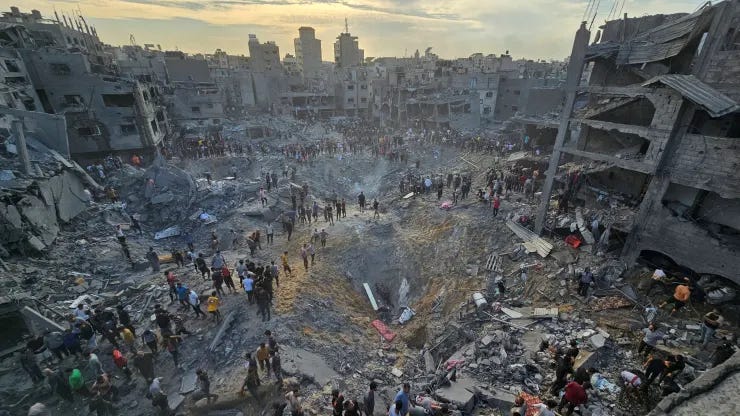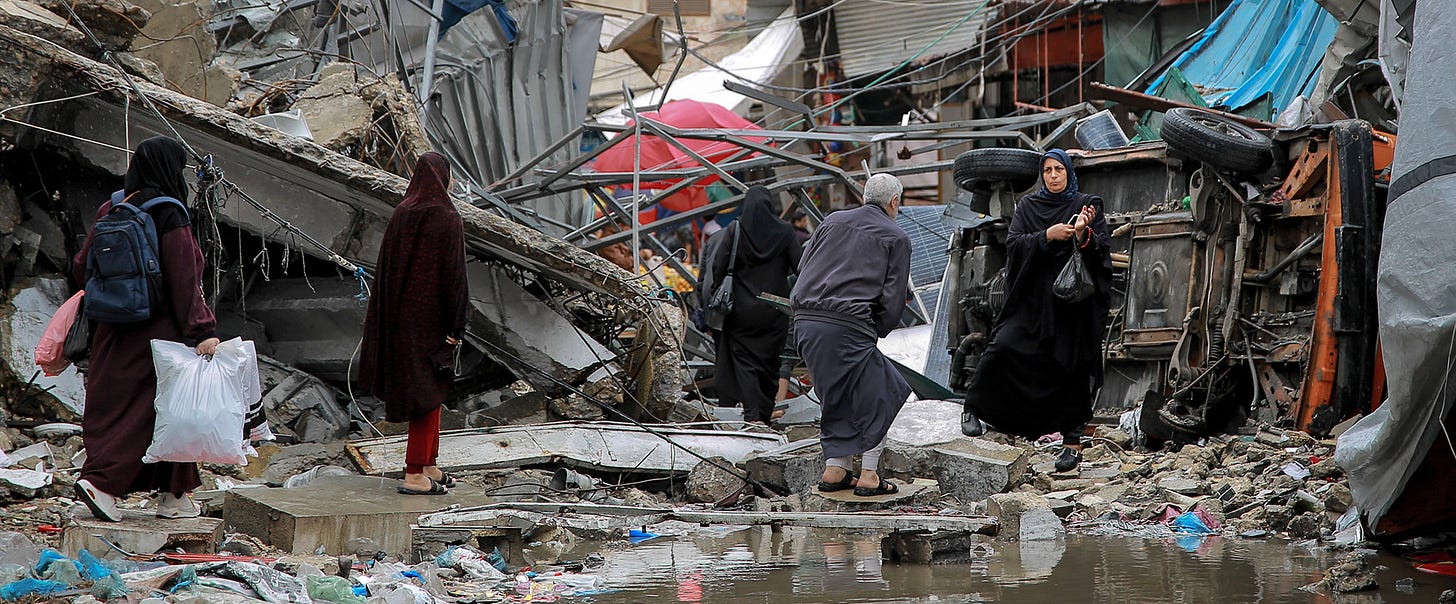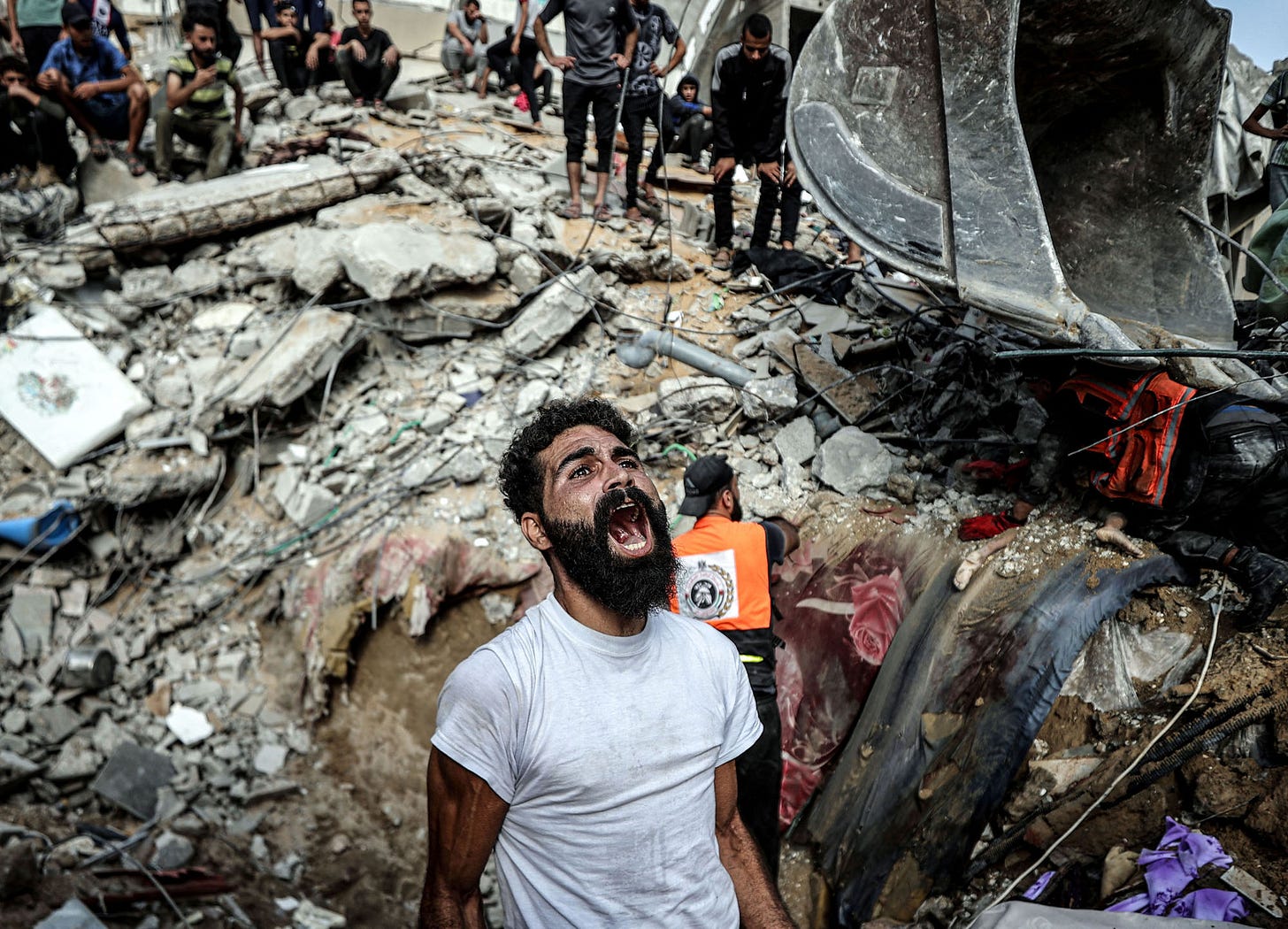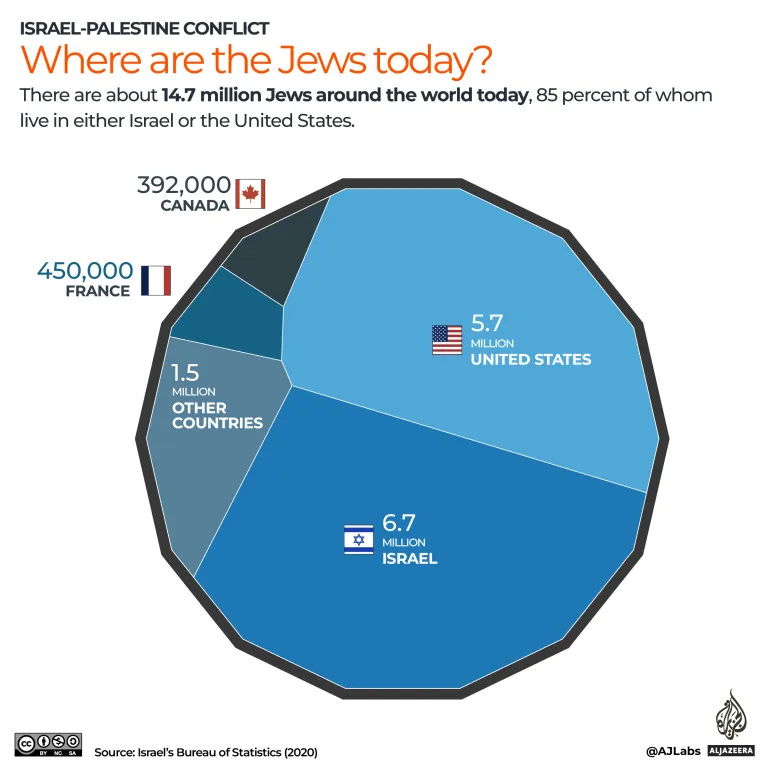French TV news is ignoring the massacre of Gazans
The 3 most-watched French TV news broadcasts are unwilling to devote any significant coverage to Israel's slaughter of Gazan civilians.
A news analysis reveals a shocking absence of coverage on French television news about the desperate fate of Gazans. More than 30,000 people have been slaughtered by Israel’s brutal military campaign in the Palestinian enclave since its military retaliation to the October 7th attack by Hamas. The most striking revelation is that of the 20 TV news broadcasts analyzed from the 8th to the 14th of January (from when South Africa’s genocide complaint at the ICJ was making headlines to the 100th day of the war), only 29 seconds of airtime were devoted to the plight of the Palestinians in the three most-watched national news broadcasts. It works out to 5 seconds for TF1, 10 seconds for M6, and 14 seconds for France 2.
The indiscriminate, mass slaughter of Gazan civilians is made worse by the humanitarian disaster gripping the territory. Life already difficult under the harsh, restrictive conditions imposed by the Israeli blockade since 2007 has been made utterly unbearable. Those who are left standing after the missile attacks are starving, scrambling to find food of any kind. Basic food supplies are either lacking or exorbitantly priced when they are available. Medicine and medical supplies are exhausted. Over 70,000 Gazans have been injured in Israeli bombardments and are mostly left to fend for themselves.
Israel is still restricting aid deliveries from entering the territory, effectively creating a humanitarian catastrophe in Gaza that is purposeful, avoidable, and inexcusable.

Thousands of homes have been destroyed (half of all the residential buildings have been destroyed or damaged). Eleven out of 35 hospitals are partially functioning. At the start of 2024 after almost 100 days of war, Israel was killing Gazans at a rate faster than in any other 21st-century conflict, at 250 people per day.
More than three-quarters of Gaza’s 2.2 million people are internally displaced. More than a million are crammed into Rafah, a tiny sliver of land with a population that is now five times larger than it was before the war.
The fundamental rule of international humanitarian law in conflict is that all parties must distinguish, at all times, between combatants and civilians. Civilians and civilian objects must never be the target of attack; parties may only target combatants and military objectives.
According to the Norwegian Refugee Council, “airstrikes and rocket attacks by Israel, Hamas and other armed groups that target civilians or are indiscriminate violate the laws of war, and, when committed with criminal intent, are war crimes.”
Of the more than 30,000 dead in Gaza, 25,000 are women and children. Around 12,500 of Israel’s victims are children.

5 minutes out of 30 hours of news programming
A second news analysis reveals that a month later, from the 4th to the 15th of February, on the primetime 1 pm and 8 pm news programs on TF1 and France 2 (46 news broadcasts for a total of almost 30 hours of airtime) the plight of the Gazans did not feature in any dedicated report. “No news program, on any channel, gave any figures for the total number of deaths in Gaza during this period—more than 28,000 to date.” Of the 30 hours of airtime, there were two stories about the Israel-Gaza war “on France 2's 8 pm news program for a total of 5 minutes of coverage.”
It’s not as if these French channels didn’t have an appetite for international news.
Over the same period, all the TV news programs broadcast reports or on-set discussions on the cancer of Charles III in the United Kingdom, bad weather in California, volcanic eruptions in Iceland, fires in Chile, Joe Biden's possibly failing memory, and demonstrations linked to the postponed elections in Senegal. The war in Ukraine was also mentioned—albeit minimally—by the TF1 and France 2 news channels.
The glaring absence of Gaza coverage becomes painfully obvious in the face of such devastating carnage and brutality targetting a civilian population.
The blatantly insubstantial coverage in French TV news regarding Israel's war crimes not only hinders public awareness but also perpetuates the downplaying of the significance of these violations. This lack of exposure and discussion contributes to diminished public engagement, impeding efforts to hold Israel formally accountable for its numerous breaches of international law.
How is it possible to ignore this catastrophe?
The Zionist project
Answering this question requires looking at the historical context in which this indiscriminate slaughter is happening. For some, the current Israel-Hamas war began with the events of October 7th, in which over 1,100 Israelis were killed by Hamas militants in a surprise attack, prompting a military retaliation by the US-supplied Israeli Defense Force. But in the eyes of many Palestinians, the October 7th attack is yet another battle in the greater war that has pitted Israelis and Palestinians against each other since Al Nakba, or Catastrophe, in 1948.
Between 1947 and 1949, at least 750,000 Palestinians from a 1.9 million population were made refugees. Zionist forces had taken more than 78 percent of historic Palestine, ethnically cleansed and destroyed about 530 villages and cities, and killed about 15,000 Palestinians in a series of mass atrocities, including more than 70 massacres.
Al Nakba was the beginning of the Zionist project to establish a Jewish homeland in Palestine by force. A basic historical map shows the success of the project.

A key factor in understanding the reluctance to publicly support Palestinians even in the face of the worst civilian massacre of the century depends on making a clear distinction between Judaism and Zionism. It also depends on making a distinction between Hamas and Palestinians.
Judaism is a religion and cultural identity that has evolved over millennia. It is a complex phenomenon of a total way of life for the Jewish people, comprising theology, law, and innumerable cultural traditions.
Zionism is a political ideology that dates back to the end of the 19th century centered on the establishment and preservation of a Jewish state in Israel. According to its foundational texts, “Zionism strives to create for the Jewish people a home in Palestine secured by public law.” Zionist ambitions lead to a mass emigration of Jews to Palestine in the early 20th century. “In March 1925 the Jewish population in Palestine was officially estimated at 108,000, and it rose to about 238,000 (20 percent of the population) by 1933.”
The Palestinian people are Arabs who live—and have lived throughout history—in a certain geographical region in the Middle East. Generally, Palestine is used to refer to the geographic region spanning from the Mediterranean Sea in the east to the Jordan River in the west.
Historical Palestine is made up of the current Palestinian territories of the Gaza Strip and the West Bank—referred to as the State of Palestine—and the country of Israel. Both of these territories were captured by Israel during the Six-Day War in 1967. In these areas combined, there are around 7 million Palestinians.
Hamas stands for the Islamic Resistance Movement and in Arabic means “zeal”. The group politically controls the Gaza Strip but not the West Bank, which Fatah governs. Hamas has been in power in the Gaza Strip since 2007. It is considered a terrorist group by the EU and the United States.
The language of the 1917 Balfour Declaration that led to the creation of Israel in British-controlled Palestine stipulates that “nothing shall be done which may prejudice the civil and religious rights of existing non-Jewish communities in Palestine.” But the reality of Zionism is the dispossession of the land owned or lived on by the non-Jewish inhabitants of Israel to create a homeland exclusively for Jewish people.
According to the Jewish Voice for Peace (a US-based grassroots organization working towards Palestinian freedom and Judaism beyond Zionism), “as long as Zionism has existed, so has Jewish dissent to it.” There are significant numbers of Jews who oppose Zionism, from Orthodox Jews to peace activists. “Jewish anti-Zionists span a political and religious spectrum, from religious and secular progressives who view opposition to Zionism as an anti-racist praxis, to ultra-Orthodox Jews who oppose Jewish dominion until the time of the Messiah, to anarchist Jews who oppose the very concept of nation-states, Jewish or otherwise.”
“Many Palestinians take anti-Zionist positions or identify as anti-Zionist because of the current and historical practices of the Israeli state.”
Since the establishment of a Jewish state, Zionists within the Israeli political establishment have sought to displace the Arabs living in Israel per the objectives of Zionism. “There is evidence that Zionist leaders were already thinking about the removal of the indigenous population before the actual occurrence. On February 7, 1948, Ben-Gurion told the Central Committee of Mapai (the largest Zionist political party in Palestine) ‘It is most probable that in the 6, 8 or 10 coming months of the struggle many great changes will take place, very great in this country and not all of them to our disadvantage, and surely a great change in the composition of the population in the country.’”
When he spoke in 1948, David Ben Gurion knew that thousands of Jews had already relocated to Israel from Europe.
Deliberate conflation
“Criticism of Zionism is not to be conflated with antisemitism.”
- Jewish Voice for Peace
The deliberate conflation between Zionism and Judaism is a long-established tactic to silence critics of Israel and its treatment of Palestinians. The formula is simple. Any poignant criticism levied against Israel’s Zionist ambition is rapidly branded anti-Semitic and dismissed without pause to consider the content of the claim.
French newspaper Le Monde wrote about the insidious use of this tactic back in 1969. Claude Bourdet wrote that “for twenty years, and especially since 1956, Israeli propaganda has succeeded in popularising a ‘conflation’ that is as absurd as it is politically effective: to oppose the policies of the State of Israel is to be ‘anti-Semitic’.”
Supporters of the Zionist ethnostate project are quick to resort to labeling critics as racist anti-Semites opposed to the establishment of a Jewish homeland after the atrocities suffered by Jews during WWII.
This conflation has allowed Israel to carry out crimes against humanity and the ethnic cleansing of Palestine with little to no pushback from the international community. Amnesty International has found that “through massive seizures of land and property, unlawful killings, infliction of serious injuries, forcible transfers, arbitrary restrictions on freedom of movement, and denial of nationality, among other inhuman or inhumane acts, Israeli officials would be responsible for the crime against humanity of apartheid.”
Amnesty International has also found that “Israeli authorities continued to refuse to cooperate with the investigation by the ICC Office of the Prosecutor, despite a 2021 decision by the ICC to initiate an investigation into the situation in Palestine. The authorities also failed to adequately investigate violations and crimes under international law.” This is all possible, according to the human rights group, because of the “impunity” Israel is granted “thanks to the support of its key allies.”
According to the Jewish Voice for Peace, “Zionism has meant profound trauma for generations, systematically separating Palestinians from their homes, land, and each other. Zionism, in practice, has resulted in massacres of Palestinian people, ancient villages and olive groves destroyed, families who live just a mile away from each other separated by checkpoints and walls, and children holding onto the keys of the homes from which their grandparents were forcibly exiled.”
So successful is the tactic of labeling critiques of Zionism as critiques of Judaism that a May 2018 poll conducted by IFOP revealed that 54% of French people believed “anti-Zionism is a form of anti-Semitism.”
The same poll revealed however that 71% of French people believed “that Israel bears a heavy responsibility for the absence of negotiations with the Palestinians.” Even more revealing, 57% had a “bad image” of Israel and 69% believed that Zionism was “an ideology that Israel uses to justify its policy of occupation and colonization of the Palestinian territories.”
The Israeli campaign against Palestinians isn’t restricted to Gaza. In the occupied West Bank, the UN Office for the Coordination of Humanitarian Affairs (OCHA) recorded 561 incidents of Israeli settler attacks against the Palestinians between October 7 and February 20. The West Bank is run by the Palestinian Authority and Fatah under Mahmoud Abbas, and the groups are opposed to Hamas.
It’s a ramping-up, if not simply a continuation, of the policy of displacement of Palestinians that has been practiced for decades by Israeli settlers in blatant disregard of international law.

In both the West Bank and Gaza, Israel’s policy is to destroy the possibility of Palestinian livelihood.

Delicate tip-toeing
The marketing of Israel in the West has long been disingenuous, receiving acclaim as the ‘only democracy in the Middle East’ while carrying out a policy of ethnic cleansing against Palestinians. According to French journalist Jean Stern, it’s “the only openly racist far-right country that is celebrated as a democracy.”
Numerous human rights organizations have qualified Israel as an “apartheid” state. According to journalist Latifa Madani, “detailed, well-argued reports from Israeli NGOs such as B'Tselem and Yesh Din, and from international organizations (UN, Council of Europe) and non-governmental organizations (Human Rights Watch and Amnesty International), have shown that the laws, policies, and practices put in place by the Israeli authorities have progressively created a regime of apartheid against the Palestinian people.”
The main French television news broadcasts won’t approach anything that resembles empathetic coverage of Palestinians—or even any coverage of Israel’s indiscriminate targeting of civilians, the IDF’s suspected use of the Hannibal directive, the deliberate use of famine as a weapon, the restriction of aid, and the suffering of countless elderly people and children.
The inability to cover the unfolding humanitarian catastrophe in Gaza is intimately tied to the delicate tip-toeing of French media in approaching anything that resembles openly criticizing the Israeli government. The broadcasters are keen to hold on to their ever-aging audience and especially to avoid the anti-Semitic label or offending the 450,000 Jews who live in France that may have intimate ties to Israel. And many French Jews do since there are at least 50,000 Jews of French origin living in Israel’s illegal settlements in the West Bank.
As the carnage wrought upon Gazans continues unabated and ceasefire negotiations stall, it becomes less and less conscionable to avoid covering their suffering. The news analysis concludes with a final round of observation:
Between February 15 to 22, 26 news programmes on TF1 and France 2 totalling over 16 hours of coverage were analyzed. On TF1 and France 2's 1 pm news, there was no change: no mention was made of the fate of Gazan civilians. On the other hand, France 2's 8 o'clock news devoted more than 9 minutes to Gazans in three sequences on three different news programs. In proportion to the total airtime, this represents a tripling of the time allocated. But the number of deaths caused by the war in Gaza was not reported on air.
The Hamas attack against Israeli civilians on October 7th provided the imperative needed to further the Zionist goal of the removal of non-Jews from the Palestinian territories. As Gazans flee Israeli bombs and crowd into the southern region of the besieged enclave, plans are being made for the relocation of Gazans into refugee camps in Egypt’s Sinai region. Time will tell just how successfully the international community allows the Zionist project to be realized at the expense of the Palestinian population.





